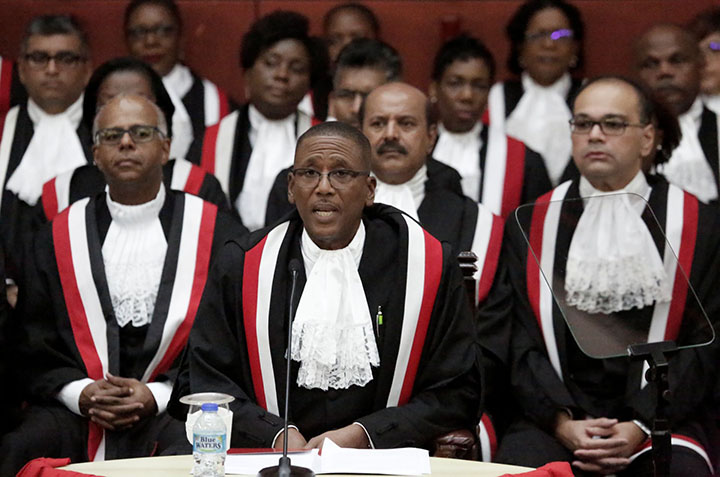(Trinidad Guardian) Chief Justice Ivor Archie has opened the new law term with a scolding for the media for what he contends is the abdication of its duty to act responsibly.
Flanked by judges as he sat in the Convocation Hall at the Hall of Justice in Port-of-Spain, Archie criticised the media for depending on “hardly reliable” and “uninformed” sources in its reporting.
Since 2017, Archie has been under intense media scrutiny for allegedly trying to sway judges to change their official security provider from a company hired by the State to a service provider in the private sector.
The firm he allegedly suggested was the employer of his friend, Dillian Johnson, who had a fraud conviction record.
There were also claims that he used his judicial rank to try to obtain State housing for certain individuals.
The Law Association launched an investigation into the claims and submitted a report to the Prime Minister calling for him to trigger Section 137 of the Constitution and appoint a tribunal to explore possible impeachment of the Chief Justice.
The Prime Minister has said his legal advice showed inadequate substantiation for that request, and the Law Association is contemplating taking the matter to court.
Speaking about improvements in judges’ productivity levels, especially after the last round of recruitment to the High Court bench, Archie told judges and lawyers that this narrative is ignored in part by “the abandonment of the fourth estate of its responsibility to educate and inform, or even to act responsibly at times.”
“At the risk of criticism, of being accused of arrogance, I have to say I am too busy doing the people’s work,” he said as he dismissed “uninformed” reporting.
“Please don’t waste any of our time,” he chided the media in response to requests for the judiciary to respond to something that is inaccurate or “impertinent.”
He also responded to the resistance mounted by Justice Carol Gobin to her appointment to the Family Court in Tobago.
Gobin has been outspoken in her criticism of Archie as the controversial allegations were made public over the last two years. In correspondence she sent to Archie after learning of her reassignment to Tobago, Gobin questioned whether the move was punishment for being vocal.
“I have been dismayed at the perception in some quarters that the assignment of judges to the Family Court implies a demotion or loss of seniority,” Archie said this afternoon.
He said the Chief Justice has the discretion to assign judges anywhere, and he said that the law makes it mandatory for judges assigned to the Family Court to have the experience, temperament and qualities that suit the position.
“Only a special type of judge goes there,” Archie said.
Archie’s address to mark the opening of the law term was the twelfth of his career at the helm of the judiciary. That makes him the longest-serving chief justice in the post-Independence era.
“That fact alone presents challenges for some people,” he said, “but we all have to suck it up and do the job we are assigned to do.”










